ESG matters: How S’pore SMEs can navigate sustainability through purposeful partnerships

As the impacts of climate change grow more evident, businesses are seeing an increased need and demand to be more sustainable.
Many companies are reporting their sustainability efforts and this is where ESG (Environmental, Social, and Governance) reporting comes into play – a framework used to measure and understand an organisation’s operations regarding sustainability and ethical issues.
For Small and Medium Enterprises (SMEs), which constitute 99 per cent of Singapore’s enterprises, embracing sustainability not only benefits the environment but also enhances market position and can serve as a valuable guideline to evaluate a company’s social consciousness.
In the long run, with comprehensive ESG practices and strategies, SMEs can gain a competitive advantage over their peers and lower their overall operating costs by over 60 per cent, while increasing their brand reputation with customers and investors.
In fact, investors in Singapore expect to invest more on sustainable assets as part of their portfolios in the next two to three years.
Given these advantages, SMEs should look to integrate ESG practices into their core operations. Yet, many still struggle to adopt ESG practices due to challenges such as budget constraints in today’s economic environment.
In recognising these challenges faced by SMEs and supporting them towards their ESG journey, DBS has implemented a sustainability framework with four key pillars – learn, connect, finance, and track better – to not only meet the growing demands for sustainability and ethical responsibility, but also thrive in Singapore’s business landscape.
Knowledge, partnerships, financing, and tracking are key to tackling ESG challenges
The first pillar under DBS’ sustainability framework is the “Learn Better” pillar, which is designed to equip resource-constrained SMEs with basic concepts in the sustainability space and bolster their knowledge with the latest ESG trends.
The bank has partnered key industry experts to provide an array of workshops, ranging from the fundamentals of sustainability to intermediate masterclasses for SMEs to learn more about sustainability and the importance of adopting sustainable practices for their businesses.
These workshops are curated to equip SMEs with insights and knowledge on various topics, such as Singapore’s sustainability standards and guidelines, how to successfully establish their decarbonisation roadmap, and enabling companies to obtain assurance and verification to gain a competitive edge.

It’s essential for SMEs to understand and identify key areas and trends in the sustainability space. Through DBS’ “Learn Better” pillar, SMEs can stay abreast with the latest regulations and trends, integrating them into their operations to ensure their business remains relevant and responsive to evolving environmental and social expectations.
Having knowledge and key information of the latest sustainability trends is only the first step for SMEs to kickstart their ESG journeys. The second pillar of DBS’ framework – “Connect Better” – is designed to match SMEs to the right strategic partners to successfully navigate the sustainability space.
Under this pillar, DBS facilitates connections between SMEs and leading industry partners, such as Deloitte, TUV Sud and Schneider Electric. This is achieved through curated programmes and hands-on training, including personalised consultations, employee training, access to thought leadership resources, and assistance in obtaining assurances and certifications in sustainability.
These offerings are also supported by the government, and SMEs may qualify for subsidies, making them both accessible and budget-friendly options.
The right strategic partners play an integral part of a business’ sustainability journey. Through these partners and programmes, SMEs can look forward to fostering sustainable practices for their businesses and tap into specialised expertise and resources.
Additionally, DBS also offers a range of financing options under its third pillar – the “Finance Better” pillar – to further facilitate SMEs in enabling sustainability transition.
Embracing sustainability often involves significant expenditures, such as investments in equipment, working capital, and innovation. Recognising these financial demands, SMEs can leverage DBS’ comprehensive financing solutions to ease the financial burden associated with it.
DBS offers tailored financing for eco-related projects, including loans for development capital, renewable energy projects, equipment and vehicle purchase, sustainable trade, as well as the newly launched environmentally-friendly renovation loans, with a simple aim to help SMEs manage their cash flow.

SMEs that have already implemented innovative green solutions to tackle environmental challenges can also apply for DBS Foundation’s Business for Impact Grant Award, which provides grants of up to S$250,000 to scale up SMEs and their positive impacts.
At a time where higher costs are pushing businesses to deprioritise their ESG efforts, DBS’ range of financing options can be the lifeline to SMEs looking to bolster their sustainability journey.
By helping SMEs to “Finance Better”, these businesses can focus on their cause, not their cost in today’s economic environment.
DBS recognises the importance of businesses to be sustainable, as such, it provides a suite of tool kits under its “Track Better” pillar to help you assess your business’ readiness and sustainability maturity.
With DBS’ ESG Self-Assessment tool, SMEs can obtain a comprehensive analysis on their state of readiness and receive actionable recommendations to address your challenges in sustainability.
DBS is also currently in the process of rolling out an ESG Reporting tool, which can help businesses identify areas of improvement and streamline their ESG reporting and analytics.
It’s important for SMEs to stay on top of their sustainability game. With personalised recommendations from DBS’ suite of sustainability tools, SMEs can seamlessly identify and address their sustainability challenges.
Through these four key pillars, DBS hopes to equip SMEs with the resources they need, from knowledge to financing, to help them transform their businesses and adopt more sustainable and inclusive business models.
CW Aero Services leveraged DBS’ solutions to electrify Changi Airport

One business that has benefited from DBS’ sustainability framework is Singapore-based CW Aero Services, which provides equipment to support airports, airlines, ground handling companies, and aircraft maintenance companies to ensure aircrafts can take off on time, and are maintained to industry standards.
Julian Valette, the company’s co-founder and Managing Director, has a long-standing commitment to sustainability, and has personal ambitions to integrate sustainability into CW Aero Services to position it as a leader in the aerospace industry.
In line with this strategy, the company has decided to “electrify” Changi Airport and reduce carbon emissions produced around the airport. However, despite the promising foundation of the electrification plan, the execution of such a large-scale project presented significant challenges for CW Aero Services.
Julien shared that electrification involved the conversion of the equipments’ power sources from oil to electricity, which was not straightforward and very costly. This prompted them to turn to DBS to finance and power their sustainability journey.
DBS has been our bank for many years now, and they also supported us in our operations and development. We were very happy to hear that they were offering loans and facilities for sustainable projects.
Julien Valette, co-founder and Managing Director, CW Aero Services
With DBS’ support, the company was able to obtain the capital needed to purchase and finance the shipping of equipment from overseas manufacturers, including Europe, to electrify Changi Airport. “The bank also helped us finance these assets when we went for leasing models,” added Julien.
He further acknowledged that throughout CW Aero Services’ airport electrification plan, the bank was “the driving force” that pushed them to go the extra mile in their sustainability efforts.
All in all, Julien affirmed that DBS was the key enabler throughout the implementation of CW Aero Services’ sustainability strategy. Looking ahead, the SME plans to electrify more airports across Southeast Asia and position itself as a key player in promoting the transition and transformation of industries toward better ESG practices.
Kickstart your ESG journey with DBS
With DBS’ support, many other SMEs like CW Aero Solutions can embark on their sustainability journey with ease. As the backbone of Singapore’s economy, it’s vital for SMEs to acquire sustainability capabilities in order to boost the city-state’s transition to a lower carbon society.
Adopting sustainable practices not only benefits the environment, but also drives business growth. From cutting down on operational expenses to boosting brand reputation and securing investment opportunities, the benefits of implementing ESG initiatives far outweigh their costs.
Through DBS’ support to drive greater sustainability adoption, SMEs will be empowered to navigate their ESG journey seamlessly and transition into a more environmentally conscious and socially responsible business model. No matter what stage you’re at in your sustainability journey, connect with DBS here today to explore sustainability solutions for your business.
This article was written in collaboration with DBS Bank.
Feature Image Credit: Dreamstime
Also Read: Beyond the hype: Why DBS is still pursuing the metaverse with its BetterWorld concept
From challenges to opportunities: How S’pore SMEs overcome rising costs with digitalisation

Since the onset of the pandemic in 2019, small and medium-sized enterprises (SMEs) in Singapore have been grappling with numerous headwinds.
According to DBS Bank’s SME Pulse Check Survey 2023, SMEs have ranked rising global interest rates (50 per cent) as well as labour costs and availability (43 percent) as their top concerns in today’s economic landscape, followed by inflation (36 per cent), GST hike (26 per cent) and supply chain disruptions (25 per cent).
These economic headwinds have significantly raised costs for businesses across Singapore, pushing some to the brink of collapse. In fact, as of July 2023, as many as 109 companies have wound up.
Given the bleak economic outlook, 35 per cent of companies anticipate a deterioration in business conditions in the next 12 months.
In response to this, many SMEs are looking to optimise their operations through digitalisation. In fact, 32 per cent of SMEs are looking to reduce business spending and optimise operational efficiency through technology this year.
Studies have consistently shown that SMEs that embrace digitalisation can expect to see average revenue gains of 26 per cent. Recognising these benefits, a substantial 36 per cent of local SMEs have already digitised a significant portion of their operations.
Embracing digital solutions helped Intchess Asia streamline its operations
One such SME that has adopted digital solutions amidst these economic headwinds is homegrown chess academy, Intchess Asia. According to its managing director Wagish Kumar Rai, the pandemic served as a catalyst for the business to fast-track its digitalisation efforts.
“The pandemic brought about a seismic shift in how businesses operate. It became clear that a robust digital infrastructure was essential to ensure our operations could continue seamlessly,” he said.

As such, the company turned to DBS’ Start Digital programme, which offers an array of digital solutions tailored to the needs of SMEs, including access to efficient invoicing systems.
Through the programme’s accounting partner, Financio, the company was able to generate invoices quickly, saving the business time and improving accuracy while reducing the risk of errors.
With Financio, we’ve achieved nearly error-free invoicing, resulting in smoother financial transactions with PayNow and our clients. This has not only saved us time, but also enhanced our professional image.
– Wagish Kumar Rai, Managing Director, Intchess Asia
Today, the business sees a notable improvement in the speed of invoice processing, with payments being received three to five days faster than before.
Meanwhile, the programme’s digital collaboration partner, Google Workspace, has revolutionised Intchess Asia’s collaboration and communication by allowing its team to work seamlessly from various locations, which has proved to be exceptionally helpful during the pandemic as its team worked remotely.
“The cloud-based nature of Google Workspace means that our team can access documents, calendars, and emails from anywhere, ensuring that operations continue smoothly even when not everyone is in the office. It’s greatly improved our efficiency and responsiveness, which is crucial in the education industry,” said Wagish.
The digital solutions offered under DBS’ Smart Digital programme have also significantly contributed to Intchess Asia’s ability to recruit and retain talented chess instructors.
During the pandemic, Intchess grappled with reduced revenues and manpower challenges. By offering a more streamlined and efficient teaching environment through digital tools like Google Workspace, the company has managed to increase its headcount by approximately 70 per cent and raise its revenue by approximately 20 to 30 per cent.
Live Young and Well leveraged DBS’ Start Digital programme and tripled its revenue
Aside from Intchess Asia, DBS’ Start Digital programme has also helped homegrown media and advertising agency, Live Young and Well, achieve business growth through digitalisation.
As a relatively young web development agency, Live Young and Well initially struggled with credibility. Inflationary pressures further exacerbated this challenge, especially as marketing is one of the first departments that would see a budget cut during times of crisis.
With less business and clients, the company saw revenue of its second quarter decrease to nearly one-third of that in the first quarter of 2023. “For 10 months, we were earning an average of S$1,900 per month,” said John Lim, the founder of Live Young and Well.

Live Young and Well seized the opportunity to recover its losses through online marketing to grow its leads. They revamped their business strategy to accelerate digital efforts and turned to the DBS Start Digital Programme.
Shortly after adopting Google Workspace through the programme, Live Young and Well observed that their leads began to view the company with increased credibility.
In the past, John admitted that the company was often accustomed to hearing little to no responses 80 per cent of the time when they reached out to potential leads with their Gmail addresses. By using a custom email created through Google Workspace, the company has managed to raise leads to conversion from 20 to 70 per cent.
We also improved team communication from being swamped on WhatsApp to a better systematic flow over Google Workspace, reducing time wasted finding documents, chats, and links, by nine man hours per day.
– John Lim, founder of Live Young and Well
Aside from Google Workspace, the business also utilised DBS’ end-to-end cash collection system, DBS Max, enabling the business to obtain its own PayNow QR code.
Through DBS Max, the company was able to host its own Christmas pop-up store at Orchard last year. “Granted, we only earned S$142 and gained 46 customers, but this would have been halved if we had to collect cash because most customers didn’t bring cash along.”
By embracing these digital solutions, Live Young and Well’s revenue has increased by more than 300 per cent in just three months.
Digitalisation becomes more essential as a business grows

DBS’ Start Digital programme has also played an integral role in PlayFACTO @ Woods Square’s digitalisation journey.
The student care centre, which saw a significant impact on its bottom line due to economic headwinds as parents tightened their budgets, was seeking reliable IT solutions to manage its day-to-day business needs.
Prior to adopting digital solutions, the company mainly used Excel sheets for “everything from HR and finance to accounting and operations”. However, as the business expanded, the limitations of Excel sheets became increasingly apparent.

Excel sheets are fast and flexible, but [gets] painful and tedious as business scales and complexities increase. They are also prone to human error, mistakes, and version control problems.
– Wilson Ong, Centre Director, PlayFACTO @ Woods Square
Hence, the company made the decision to adopt one of the programme’s accounting software, Xero, which was a great fit to the PlayFACTO @ Woods Square business model.
As the company’s transactions are mostly banking-related such as GIRO and PayNow transactions, Xero’s integration with the company’s business model allowed it to sync these transactions, making PlayFACTO @ Woods Square’s account reconciliation a breeze.
As a result, Wilson shared that the company was able to cut down on its staff costs by 15 per cent, as it did not need to hire additional HR, accounting, and IT support headcount.
But some SMEs are still hesitant to adopt digitalisation
Aside from accounting and digital collaboration solutions, DBS’ Start Digital programme offers a plethora of digital solutions with key partners, ranging from e-commerce to digital procurement and cybersecurity solutions, which can help kickstart an SME’s digitalisation journey.
All SMEs looking to leverage digitalisation should look at the Start Digital programme for a start – [the solutions provided by the programme] are designed to be cost-effective, low-risk and reliable.
– Wilson Ong, Centre Director, PlayFACTO @ Woods Square
While digitisation can definitely benefit businesses in various facets, some SMEs are still reluctant to implement these solutions, with 25 per cent of businesses delaying their investments into digitalisation efforts due to cost constraints, coupled with inflationary pressures.
In fact, prior to implementing DBS’ Start Digital programme’s solutions, Wagish shared that his primary concern was ensuring that Intchess Asia’s investments in technology were aligned with the company’s budgetary constraints as an SME.
“This meant carefully assessing the return on investment for each tool and technology we considered,” he elaborated.
Through DBS’ Start Digital programme – which curates a suite of digital solutions with key partners – the company was able to access essential digital tools and services at affordable rates. This helped Intchess Asia manage its budget effectively, while still obtaining the necessary technology for its operations.
Another major concern when it comes to implementing digital solutions is the lack of digital skills to fully utilise these solutions. Introducing digital tools meant that a company would have to acquire the right skill sets to adapt to these changes.
In order to alleviate these concerns, the DBS SME Skills Booster allows businesses to gain access to training resources that equip their employees with skills spanning various verticals including digital and transformation, sustainability, banking and finance, as well as cyber wellness.
This proved to be invaluable to SMEs like Intchess Asia as it helped the company in bridging skill gaps within its team.
Kickstart your digitalisation journey
By adopting digital solutions, SMEs can stay more resilient and competitive amidst economic headwinds.
In order to accelerate the digitalisation of SMEs, the Singapore government is working with institutions such as DBS to support SMEs in harnessing technologies.
As such, DBS is offering a six-month fee waiver for up to two digital solutions for SMEs that choose to participate in its Start Digital programme.
“We’re thankful that the government is extremely supportive of SMEs to adopt digital solutions. [The government’s] grants subsidise the cost of adoption and give us a period to allow us to start digitalising to grow our businesses,” said Wilson.
Since its inception in 2019, the DBS Start Digital programme has helped over 37,000 SMEs. If you’re an SME looking to kickstart your digitalisation journey, explore digital solutions through DBS Start Digital programme here.
This article was written in collaboration with DBS Bank.
Featured Image Credit: 123RF
Also Read: DBS launches gamified metaverse concept ‘BetterWorld’ to tackle food waste
DBS is big on using data to reshape its workspace: Here’s an inside look of its S’pore offices
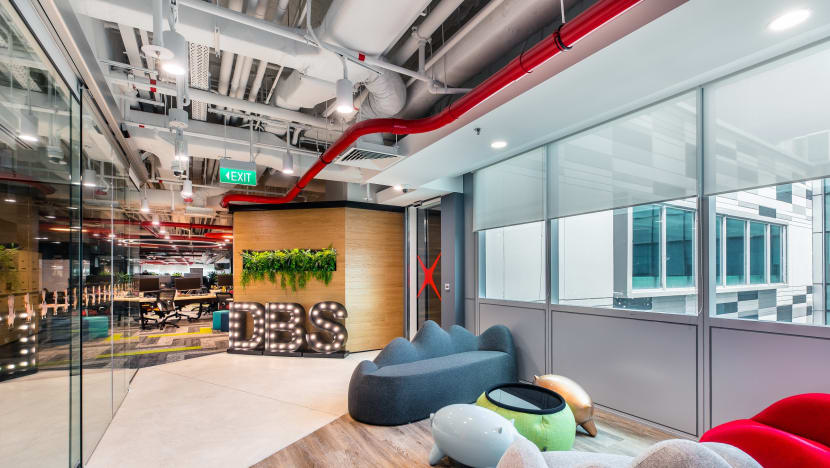
DBS has been named the “world’s best bank” for five consecutive years, which reinforces its position as an innovative company and its ambition to always be a better bank.
Now, DBS is embarking on a journey to reimagine its workspace using data and analytics. This is not an easy task, considering it’s one of the biggest banks in Asia, with a 33,000-strong workforce across 18 markets.
The COVID-19 pandemic in particular, has shifted work trends, bringing about the rise of hybrid working. In response, DBS announced in February 2021 that it has permanently adopted a 60-40 hybrid working arrangement, in which employees are given the flexibility to work remotely for up to 40 per cent of the time.
However, hybrid working is not just about a simple mix of working from home and in the office. There needs to be a synchronised balance between managers and employees, policies and employee engagement strategies, flexible versus permanent spaces, and tools that blend virtual and physical interactions.
To adapt to this new way of working, DBS has rolled out a series of transformational initiatives spearheaded by its cross-functional regional Future of Work team. This includes the Corporate Real Estate Strategy and Administration (CRESA) team – they are the custodian of DBS’ real estate assets, while helping to drive the work culture and improve employee experience.
Together, they have conducted research, deep-dive experiments and employee surveys to find out how they can improve the way employees work and identify ways to thrive in the new normal.
Creating a workspace with the employees’ needs in mind
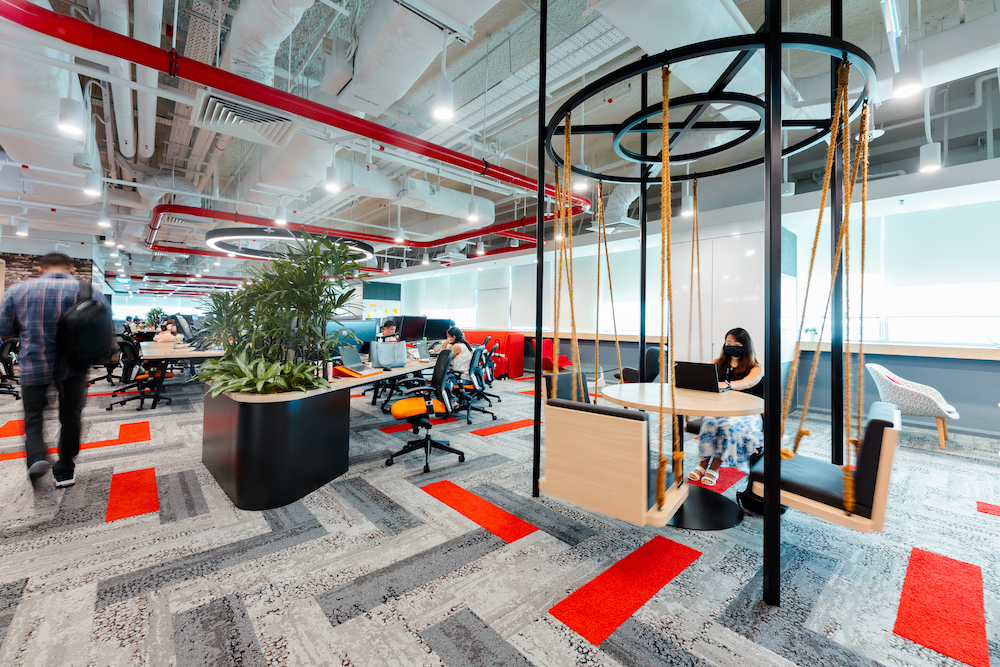
The bank’s effort to transform its workspaces is nothing new. In fact, it dates all the way back to 2016, when it first experimented with JoySpaces.
JoySpaces breaks away from the traditional office design filled with cubicles, and transforms workstations into activity-based workspaces to emulate a startup culture. This was first met with skepticism, but eventually won support from CEO Piyush Gupta.
It had started out as a small experiment within CRESA, in which team members worked around a large dining table instead of their own desks. This brought the team closer through open communication and collaboration, and the number of emails sent among themselves reduced by 40 per cent.
Managers and non-managers were also not “tethered to a space”, which helped remove the sense of hierarchy.
They also came up with the concept of creating different zones to cater to different needs of specific teams with community-building in mind. This means that there is a space for everyone and every mood – breakout zones to ideate, quiet zones and pods for focused work and collaboration zones for meetings.
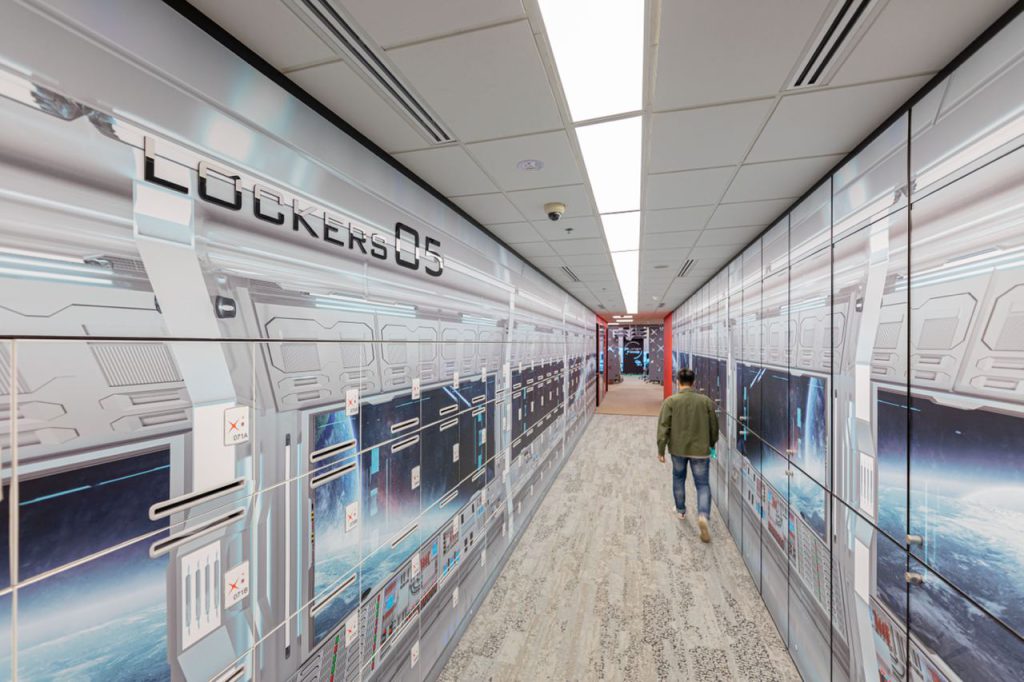
In addition, they also introduced lockers that allow employees to store their belongings in a safe space, which was well-received.
The success of this experiment inspired CRESA to scale the idea of workspace redesign across the rest of the bank.
Their research revealed that over 80 per cent of its employees have indicated that they prefer to have more open collaboration spaces to facilitate informal discussions and cross-team ideation, which they found difficult to do remotely.
Building on its experience in developing JoySpaces, DBS is looking to further reconfigure its workspaces to enable greater collaboration and ideation. After all, such curated spaces for teams form the hardware of hybrid working.
At the core of it, data is being used to improve the design of office spaces. Each team is consulted on how they would like their ideal office space to look like, and how they usually work.
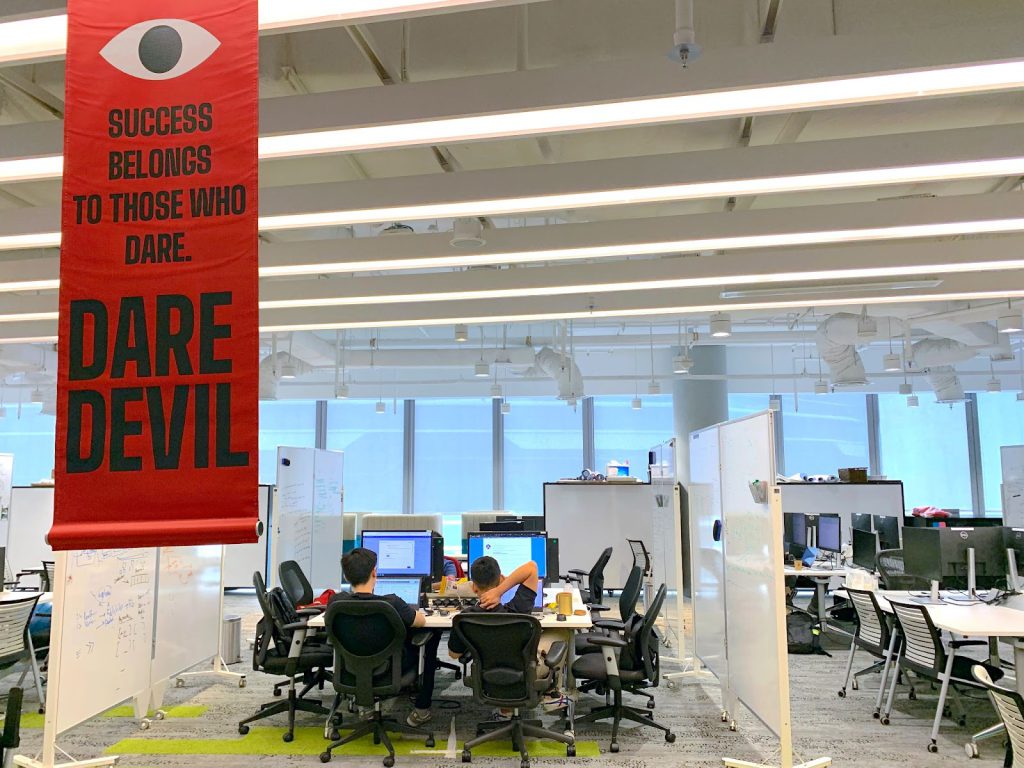
This is why the innovation team’s office design at its innovation hub DBS Asia X (DAX) features wide, open spaces with moveable furniture that mimic co-working spaces. Since the team requires a lot of group discussions in their daily work, the office has plenty of whiteboards around to encourage brainstorming and ideation.
Beyond focusing on helping employees be more efficient, DBS makes it a point to integrate such social spaces to encourage its employees to take a pause from their work and prevent burnouts.

At the DAX office, it also has an open-space garden that allows employees to bask in nature and relax, as well as a ping pong table for them to have fun and unwind from work.
Ultimately, DBS wants to create spaces that maximise the potential of face-to-face collaboration and innovation, enhance connections to build a community, and effectively integrate work and social spaces.
They continually test and improve on it for the best design iteration
To further understand how workspaces can positively impact the employee experience in the hybrid working world, DBS ran a series of workshops with employees across its six core markets in 2021.
Some of the key insights learnt was that face-to-face interaction was deemed necessary for connections. In-person interactions boost collaboration and cooperation, which in turn, results in increased productivity when working in the office.
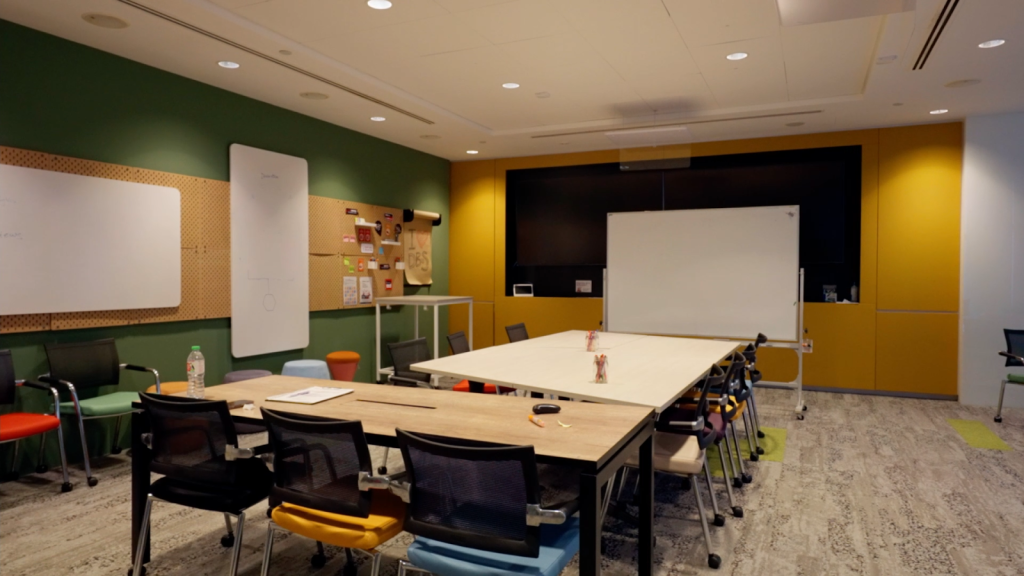
To address this, CRESA incorporated ideation rooms across the office to facilitate more informal discussions and cross-team ideation with features such as an entrance experience, colourful and moveable furniture and ideation prompts – all of which have proven to help employees reset their minds and in turn, generate better quality of ideas.
Additionally, employees also expressed their desire for more social and wellness spaces. However, the “fear of judgment” affects the utility of the space.
To tackle this, CRESA piloted social and wellness spaces and activities to create social destinations, and a culture where socialisation during work hours is accepted and encouraged.
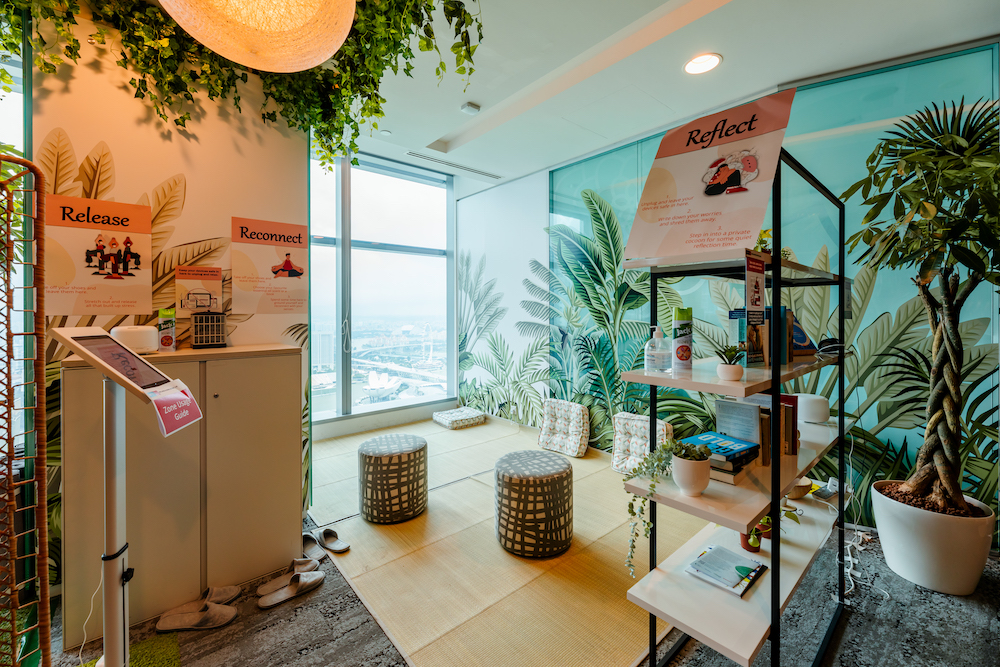
Nestled in a corner at the 42nd storey of DBS Bank’s office in Marina Bay Financial Centre, lies a wellness space that houses sleeping pods, a reading corner with relaxing music, and yoga mats sprawled in front of large windows that display stunning views of the city skyline.
The space is intentionally tucked in a corner that is out of bosses’ sight, so employees can freely take work breaks and recharge without feeling conscious of being perceived as unproductive.
This space was first set up in July as an experiment, and is now being progressively scaled across DBS offices.
Employees are also free to sit at other spots within the office whenever they want to have a change of working environment. This helps to drive ‘water-cooler’ moments – not just to spark innovation, but also allow employees a chance to chat and interact with other colleagues as well as find mental breaks to help reduce work stresses.
Besides the workshops, DBS also conducted regular employee surveys to get feedback on what employees want in a workspace. With these surveys, employees – regardless of those working from home or in the office – can get their voices equally heard. When their ideas get implemented, it increases their sense of belonging to the company.
Moreover, a company needs to offer an office environment that edges out the experience from working from home to lure employees to return to the office. This is why DBS is investing in better technology and amenities that help make work easier than if it were done at home.

For example, with employees dialling into hybrid meetings from the office, noise levels need to be managed well, so DBS started installing soundproof pods.
It also started an IT delivery service, which sends over relevant equipment to employees working from home to ease any hiccups with technology.
DBS also adopted a “test and learn” approach, in which it designs and implements pop-up spaces around the office to test certain hypotheses. Some of them worked, while some didn’t.
One successful experiment is when they built an entrance experience to the ideation room. The research showed that the immersive journey helped users shift focus to the upcoming task and improved performance in the ideation sessions.
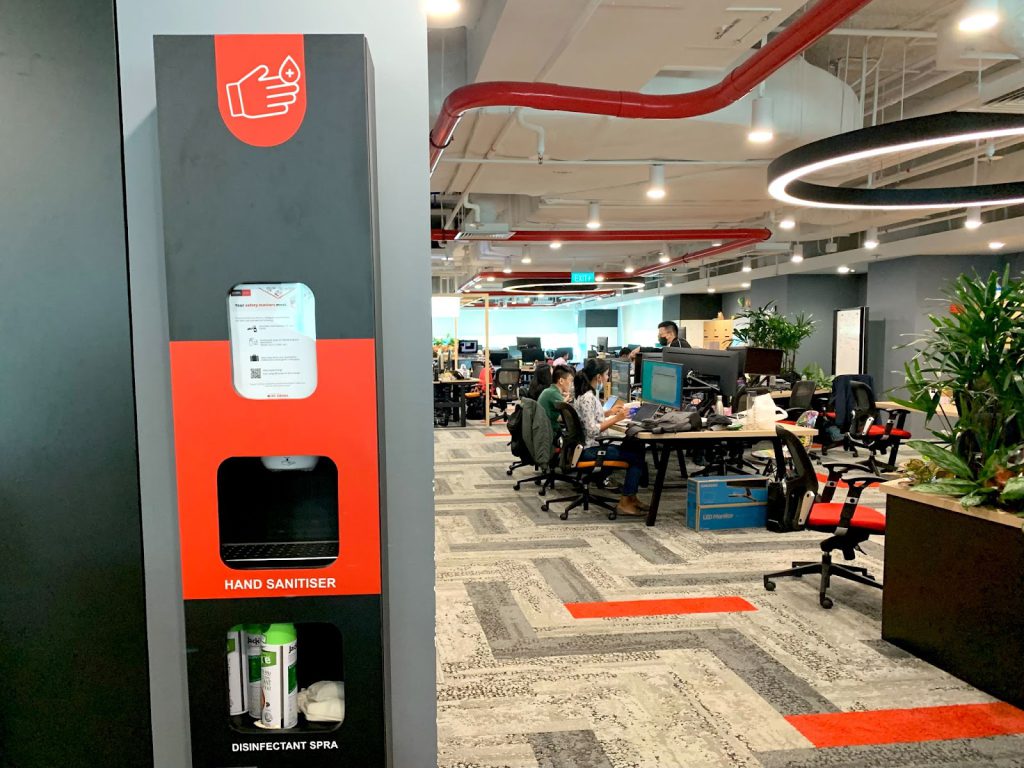
On the other hand, one experiment that didn’t work out is the pedals for hand sanitisers, which is an office essential during the pandemic period. When employees stepped on the pedals, the sanitisers squirted on them instead, creating a mess.
This prompted them to rethink the design and deploy free-standing sanitiser stations with automated dispensers instead, which also come with a shelf of disinfectant sprays.
Office will continue to be a pivotal part of the work life
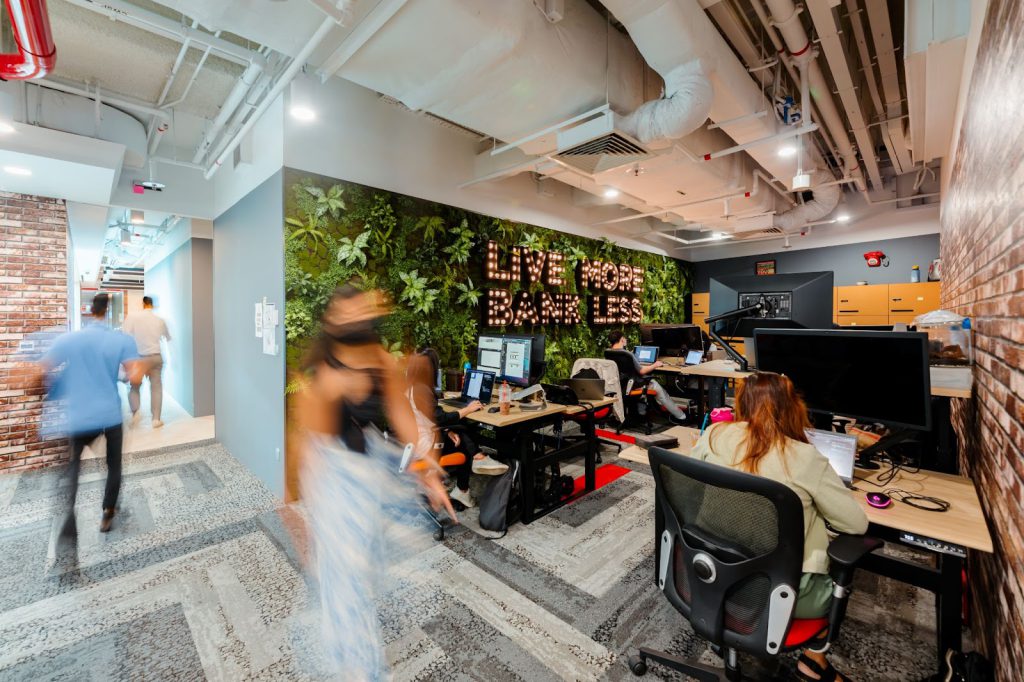
Beyond the post-pandemic era, hybrid working is here to stay and is seen as the future of work. As outlined in DBS’ annual report 2021, the workspace has a role to play in the new normal.
Offices remain an important part of the working environment, and will never disappear. In fact, a physical space and face-to-face interaction is irreplaceable when it comes to building connections.
“We firmly believe the office will continue to be the ‘soul of the company’. The challenge, however, is how people work and adapt in hybrid situations,” said Erwin Chong, MD, Group Head of CRESA at DBS.
He added that hybrid working is best not left to chance – “there is a need to design, plan and adapt.”
However, there is no one-size-fits-all solution when it comes to designing a hybrid workspace. Each company is unique, and for DBS, it has continually experimented with various ideas to test what works best.
At DBS, it strongly believes in making work joyful for employees by offering them flexibility and choice. By reimagining their workspace to allow employees to better adapt to working in the new normal, it can best help drive employee experience, enablement and engagement.
For instance, DBS removed the requirement for new joiners to fully work from office in the first six months after internal surveys showed that these hires were just as productive and satisfied with a hybrid work arrangement.
When it came to employee welfare, DBS also rolled out various support such as telemedicine consultation and webinars to help employees better take care of their physical and mental wellbeing.
Thanks to such initiatives, one of its survey findings revealed that 92 per cent of DBS employees said that they have adapted well to hybrid work, compared with 84 per cent in February.
As its employees’ satisfaction with hybrid work rose, DBS undoubtedly stands to benefit too. At the end of the day, a reimagined workspace brings about a win-win situation for both employees and employer.
It’s also important to note that such change is not a one-time effort, but a continuous process.
As such, the bank is committed to further experiment with spaces and will continue to deploy analytics to understand how usage of these spaces will evolve over time so they can refine the workspaces accordingly, ensuring that it’s centred around the DBS culture and the needs of its own employees.
This showcases the perfect opportunity to work the way they bank – agile and future-focused.
This article was written in collaboration with DBS Bank.
Featured Image Credit: DBS Bank
Also Read: From startup to success: How these S’pore entrepreneurs stay ahead with the right resources
Hard hit by inflation, who can millennials and Gen Zs in S’pore turn to for help?

Inflation is this year’s defining economic story. We see clear signs of it when taxi companies raise prices for the first time in a decade and public transport fares are to be raised later in December 2022. On top of this, utilities companies are also raising prices, and food as well as property prices are also climbing at record rates.
High inflation is now a core fact of life many of us have to deal with, especially for young millennials and Gen Zs living in Singapore. This is why many of them have taken to expressing their concerns on the effects of inflation in finance-centric online communities such as The Burrow by DBS.
As fresh faces in the workplace, young millennials and Gen Zs often earn less than their older colleagues, which means they may have even less to spend but still need to save.
In fact, research by DBS showed that 40 per cent of consumers are already seeing their
Right now, my spending mainly goes to transport. I keep myself disciplined by allocating percentages of my disposable income – 50 per cent to transport, 30 per cent to food, 10 per cent for any shopping needs, and the rest on anything else that may come up. – Jiaming, 26, investment analyst at a VC fund But the impact of inflation is challenging to overcome even with strict measures, and not everyone will be comfortable with such austerity. For those with a smaller capacity to save, it could mean the need for massive lifestyle changes. “I’ve already begun to feel the pinch from inflation. I now have to be far more conscious of my expenses, and I find myself holding back on spending, especially when it comes to my ‘wants’,” said Lisa, 23, a performance marketing associate. She has since scaled down on discretionary expenses like fitness packages, and makes it a point to save around S$2,000 every month. It’s one of the most consistent strategies that I employ. Immediately after getting paid, I store my savings in a separate account and lock them up, so that I’m not as flippant with my spending. – Lisa, 23, performance marketing associate Most of us probably sit somewhere in the middle. With inflation affecting everyone, cutting back on spending is a difficult – but necessary – action we all have to take. Such actions can be difficult to take alone, but it becomes easier when you have peers to help you out in this journey. The Burrow does exactly that – it allows people to band together as they share and find solutions on an online collaborative space. While some members discuss how best to cut down on expenses, others talk about ways to protect savings from the effects of inflation. Young adults have a unique position in the fight against inflation. Being tech-savvy and having access to plenty of online resources may enable them to make informed financial decisions, but they are also challenged by information overload. They need to carefully identify what’s true, what’s current, and what will work best for them. There’s also safety, or comfort, in numbers. While many millennials are facing financial uncertainty, connecting with others in the same boat or those who’ve successfully beat inflation can be a source of helpful and honest information. Lucky for Jiaming, his friends were ready and willing to give advice on how to cut expenses and save more. However, not everyone is fortunate enough to already have friends who want to talk about money, more so friends who are financially independent and in a position to give useful advice. This is where online communities like The Burrow come in handy. Members are free to discuss and share their financial problems, and there are many industry experts and other individuals there who can offer relevant insights and interesting points of view. There are also in-depth analyses on how to grow your money despite inflation, as well as on investment products, strategies and tools to help you achieve your financial goals. Feel too shy to participate online? The Burrow has an anonymous posting feature, which removes the anxiety some might feel when asking questions or sharing POVs. All money matters are discussed in The Burrow, including money management, hacks on making the most of your money, and even events to connect with the community. For those with family financial planning in mind, there’s POSB Parents, a community specially curated for mums and dads. If you are interested in providing better for your growing family and learn how to teach your children good money habits in this digital age, this group is for you. Anyone who joins can expect tips on how to instil good money habits in their children, as well as family financial planning content to help them achieve key milestones for their family. If you’ve been wanting to save up for that family trip but haven’t found a good way to do so, this may just be the right opportunity to find out how, and get the most out of your holiday. But if discussions aren’t your thing, there’s also the DBS for Young Adults group on Telegram. It is a one-way channel where DBS/POSB shares tips on how to become financially independent, including bite-sized information on investing, as well as money and life hacks for students and first jobbers. These online communities are extremely helpful in gaining financial knowledge and keeping yourself up to date, which is crucial when you’re working to beat inflation. Besides connecting you with like-minded people, the community keeps you aware of the many DBS/POSB solutions to help you beat inflation like layering your (SAYE) accounts to earn more interest. Saving more and cutting spending, however, can only take you so far. Since inflation means that your money can buy less, some might consider exploring investments as an option to hedge against inflation. For young adults or anyone who needs to slowly ease into investing, starting with S$100 a month is the way to go with a regular savings plan like . For those hoping to maximise their savings when spending on daily necessities, they can consider the new DBS yuu Card, for more savings. Even those who do not have PayLah! or use any of the aforementioned cards, there are other ways to save, for anything from dining to entertainment, or even grocery shopping. In particular, the Insurance too might be a potential headache for many young millennials and Gen Zs, since there are so many plans available in the market. Fortunately, there are low-cost insurance plans that provide comprehensive coverage for just S$5 a month, like The Burrow by DBS
This article was written in collaboration with DBS Bank. Featured Image Credit: Getty Commercial Also Read: “I think there’s a recession coming”: DBS CEO on rising interest rates, economic slowdown

There’s an easier way to combat inflation






Financial literacy is important – do Singaporeans know enough about it?

The financial picture millennials in Singapore face today is vastly different from that of their parents.
Life expectancies today are higher than ever before. According to Channel News Asia, the life expectancy of Singaporeans is among the highest in the world at 81.4 and 85.7 for men and women respectively in 2019.
Furthermore, by 2040, Singaporeans will be living even longer lives. A forecast by the Institute for Health Metrics and Evaluation (IHME) projected Singapore’s average life expectancy to be 85.4 years in the year 2040.
This fact, coupled with a higher cost of living, renders it important for young adults to make sound financial decisions, and Singaporeans are aware that these decisions will greatly affect their future.
From achieving FIRE (Financial Independence, Retire Early) to setting up a small fund for one’s child, Singaporeans are Financial Planning Attitudes Survey commissioned by MoneySense in 2017 showed that only about one in five Singaporeans feel that they are knowledgeable about investing.
Some Singaporeans also have misconceptions about when to start financial planning.
One-fifth feel that they would only need to start financial planning when they are looking to retire, and half of young working adults aged between 17 and 29 have not started thinking about financial planning because they think it is still too early to do so.
To make educated financial decisions about investing money and saving for the future, more in-depth knowledge is clearly required.
Furthermore, Same Storm, Different Boat, a paper published under a series of research studies by DBS NAV Financial Health, highlighted that those in the 25 to 35 age group have a higher tendency to invest likely because of their lower financial commitments. This makes financial literacy even more important for youths today.
Many would have picked up basic financial knowledge about savings, investing and budgeting from their parents or peers.
However, since the experiences of the previous generations do not apply to our own completely, there is a need to seek out other avenues to stay relevant and informed.
Where then, can young Singaporeans develop the financial literacy they need?
Meet The Burrow by DBS

The Burrow is Singapore’s first bank-led community that shares financial literacy concepts and tips. Run by a small team of community managers, the community is a safe place that encourages members to learn, share and support one another.
From fundamentals around investing tools like Exchange Traded Funds (ETFs) and Unit Trusts (UTs) to everyday musings around what one would do with a sudden windfall – members can expect different thought-provoking conversations.
The Burrow is also a place where members can score first dibs on product launches and campaigns, take part in contests and giveaways, and even attend exclusive events with DBS experts and other key opinion leaders.
This allows members to grow in their own financial journeys – but be empowered to set aspirational goals while leading fulfilling lives.
For the past two years, the community has thrived via two Facebook groups – POSB Parents – with a combined membership of approximately 30,000.
The Burrow was conceived as a project group to provide useful tips and hacks to DBS Multiplier account holders, allowing them to unlock higher interest rates.
On the other hand, POSB Parents started as a platform to help Smart Buddy (the world’s first in-school savings and payments wearable for children) users solve user-related queries.
Yet, the community team saw potential to elevate the next phase of community by co-creating it together with the members. Over a two-year process, members shared feedback and their vision of an ideal community space via face-to-face immersions and online surveys.
This ground-up collaboration saw the merger of both groups, now simply known as The Burrow (members voted to keep the name). A treasure trove of financial knowledge powered by everyone from fresh graduates to young parents.
Bigger, no-holds-barred, conversations

Today, The Burrow continues to prosper as a place for members to level up their financial literacy game with content put together by experts at DBS.
Members are also regularly engaged to find out what they would like to see and learn, so that content can be deftly adapted to suit their needs.
The Burrow’s revamped, forum-like journey, housed within DBS Bank’s website, allows members to chat about anything with like-minded peers, from cryptocurrency to investing platforms.
In fact, the community team encourages discussions across a variety of topics – even if they’re not with DBS’ realm of products or services. This allows for transparent conversations around money.
The community also provides a library of resources for users to gain knowledge on pertinent financial topics in Singapore under Learning Units. Topics range from understanding the Central Provident Fund (CPF), to tips on cultivating a money saving mindset.
The best part? The Burrow members are always ready to share their two cents. This is important for young adults on the lookout for real feedback.
26-year-old Shermane Wong can testify to this. Despite frequently scouring financial literacy blogs and sites for information on investing and saving, she prefers to hear firsthand from the experiences of others in similar life stages.
“My parents are not very financially literate so they cannot guide me too. While I would love to say I am in control of my finances, I’m afraid that I’m still lacking information,” she said.
Here’s where The Burrow comes into play. The new community space features categories for dedicated conversations, so members can easily find a specific thread that caters to their needs or interests.

Under the “Ready for Retirement” category, one can pick up tips on maximising one’s Central Provident Fund (CPF) or how to retire early.
“Improve How I Manage My Money” is a popular conversation category, with over 32 different community members sharing where they would park emergency funds.

Starting a family is a monumental new milestone that comes with a whole set of different challenges one might not expect. For young parents, this means not just having good personal money management skills – but knowing how to set financial goals for the whole family.
The Burrow’s “Kids & Family Matters” conversation category is the perfect place to get started, featuring discussions like saving accounts for children.
“Even though I feel adequately equipped to achieve my financial goals, one can never be fully equipped. There will always be people out there with a better or smarter way of doing things, and resources out there that I may not know of,” said soon-to-be parent Jacky Yap.
“Our long-term financial goal is a constant work in progress and we are always looking for ways to save money and invest in good financial products,” he added.
On the other hand, 24-year-old Derrick Teo is interested in starting a small business after he graduates from university, but feels that he requires more information on the financial aspect of his venture.
“I have done a lot of research on the type of business I would like to set up, but in terms of the financials, I am hoping that I can get advice from others who might have been in the same position as me,” he said.
A community that continues to grow with you

While The Burrow features two-way conversations, young adults can also subscribe to the DBS For Young Adults on Telegram – a broadcast channel catered to those who favour on-the-go updates anytime, anywhere.
In fact, look forward to notifications on upcoming community exclusives. Coming soon are Reddit-style ‘Ask Me Anything’ sessions in The Burrow, where community members can get up-close with topic experts in DBS and other interesting collaborative partners.
Members can also look forward to connecting with one another via community meetups, and get first dibs on exclusive community swag. With previous events featuring exclusives like a free community movie, workshops with fund houses, and even parent-child bonding sessions – there’s certainly a lot to look forward to.
This article was written in collaboration with The Burrow by DBS.
Featured Image Credit: Dr Wealth
Also Read: From fresh grads to mid-career switchers: This app helps S’poreans simplify their job search
Putting Their Best Foot Forward: 3 S’pore Startups Share How They Grow Through COVID-19

Since COVID-19 hit Singapore back in January, many businesses have been badly affected as the economy gradually worsened.
Regardless of their company size, businesses across the board face multiple challenges such as cancelled funding rounds, employee layoffs and pay cuts — some founders even had to forego their salaries during this financially challenging period.
In a bid to cushion the impact, many Singapore startups have quickly pivoted their brick-and-mortar business models online.
We have also seen some local 3D printing firms taking the leap to switch their manufacturing lines to produce personal protective equipment such as face shields.
Businesses have had no choice but to adapt and adjust in order to survive this pandemic. As such, we spoke to three different startup founders on how they have been navigating the Covid-19 storm and learned about the business measures they have taken thus far to tide over this crisis.
Building Brand Awareness (And Helping Others While At It)
As COVID-19 continues to rapidly spread around the globe, brands — especially those that were badly hit — have been holding back when it comes to PR and marketing.
Due to the circuit breaker, many businesses — big or small — are focusing on internal restructuring and reducing costs to stay afloat in this uncertain environment. As such, businesses are focusing on survival rather than exploring new products or services.
– Nigel Ang, co-founder and CEO of Marzze
Marzze is an influencer and key opinion leader (KOL) marketing platform which helps businesses to reward influencers and KOLs through metrics such as sales revenue, number of leads generated with a target ROI.

While businesses are keeping a tight rein on their spending and being cautious about where they spend their marketing dollars, boosting sales is still imperative.
This is where Marzze comes in — businesses have been tapping on Marzze’s influencer marketing platform to generate more brand awareness for their existing products.
Since many influencers and KOLs have been churning out a lot of stay-home content, the startup saw it as an opportunity to leverage on its capabilities to help businesses actively monitor their ROI and ultimately help them avoid pouring more cash in an ineffective campaign.
“We are currently helping LifeSmart with their smart home products. In addition, we have helped F&B establishments such as Aroy Thai establish a stronger brand awareness during the circuit breaker,” said Nigel.

With these projects, Marzze is effectively killing two birds with one stone — they are helping brands gain awareness, while promoting themselves as a marketing platform.
Nigel was quick to credit DBS Startup Unleashed, a programme to help startups gain a foothold in their early days.
DBS Startup Unleashed programme has provided us with lots of partnerships and opportunities to build our company and our brand. We were able to tap on DBS’s strong network and resources which has opened doors to collaboration opportunities.
Being one of Singapore’s most reputable firms, our partnership with DBS has certainly enabled us to propel our brand forward.
– Nigel Ang, co-founder and CEO of Marzze
Gaining Access To Business Opportunities
In unprecedented times like COVID-19, getting access to business opportunities is a challenge.
Access to capital has also proven to be another challenge faced by many startups. Some startups may also be facing the challenge of building relationships with investors given limited interactions over video calls.
“Some investors are focusing their resources on helping select portfolio companies get through the crisis,” said Michael Oyson, co-founder and CEO of Skibre, a competitive mobile gaming platform.

Echoing his sentiment, director of Reomnify, Alexander Storey said that as a young startup, it is challenging for Reomnify to get engagement from large global businesses.
What Reomnify does is help real estate companies and retailers to understand and find a good location for their businesses. To do that, they use multiple data sources and advanced analytical tools to provide rich information of a location.

For a start, an access to a significant network of customers is important, he said. The DBS Startup Unleashed programme, which Skibre and Reomnify are also under, offers just that.
The DBS Startup Unleashed programme gave us the chance to grow through access to DBS’ significant network of customers.
– Alexander Storey, director of Reomnify
Sharing the same sentiments, Nigel said: “From getting access to digital experts, business opportunities, network expansion and creating better business prospects, DBS Startup Unleashed certainly offers significant benefits for all emerging startups.”
He added that having a multi-currency bank account with DBS also allows them to operate in more markets, thereby having a wider access to market opportunities.
Boosting An Online Presence
COVID-19 has seen many physical businesses scrambling to set up their businesses online.
For one, non-essential businesses had to find a lifeline such as pivoting online or risk facing business closure.
Secondly, F&B brands who are affected by the dining-in have been forced to digitise their ordering systems and jump onboard a delivery platform.
While Marzze has already been leveraging on technology and digital operability, they knew that they had to build a stronger online presence.
“We have been consistently marketing our services through various platforms such as Facebook, LinkedIn and our own website, and learning how we can optimise our business development moving forward,” said Nigel.
“The COVID-19 situation was also an opportunity to execute our Search Engine Optimisation (SEO) strategy, boosting our online presence and reputation in the industry,” he added.
Thankfully, startups could reach out to the digital solutions experts via the DBS Startup Unleashed Programme and receive mentorships from them.
They could also sign up for the Start Digital programme through DBS Startup Unleashed and subscribe to web-based services such as a digital payment system and integration to accounting software to manage payroll and leave, as well as cybersecurity solutions to help protect customers’ valuable data.
Strengthening Customer Relationships
Another important factor to survive through this economic downturn is to retain your clients and partners. To do that, you need to first build a meaningful working relationship with them.
“[You need to] incentivise brand loyalty, keep your partners and customers satisfied, and build relations,” advised Nigel.
However, securing new clients can be tricky in difficult times as everyone is tightening their pursestrings. As such, Nigel said that “customer acquisition can be costly.”
This is why revenue generation during unprecedented times should focus on existing business partners and customers. After all, it is cheaper to retain an existing customer than attract a new customer, which can cost five times more.
Increasing customer retention rates by five per cent increases profits by 25 to 95 per cent, according to
In our opinion, one of the important factors is having an efficient cost structure. With an efficient cost structure, it is more likely that a startup can weather an unprecedented storm like the ongoing pandemic. – Nigel Ang, co-founder and CEO of Marzze Startups that aren’t sitting on significant cash reserves are currently in a fight for survival. Amid trying times, startups should take a step back and re-strategise their business development plans and operations. “We started by streamlining processes through technology solutions to maximise efficiency and set-up a sustainable, robust cost structure which will keep us competitive despite challenging times,” said Nigel. He credited DBS Startup Unleashed Programme for helping them to maintain healthy cash flows. “It has linked us up with technology providers in various functions such as accounting, finance and payroll, at special rates. It greatly helped us leverage on technology to streamline and automate our processes, ultimately keeping our costs relatively low. This eventually played a key role in helping us tide through the pandemic,” said Nigel. Concurring with Nigel, Alexander said that DBS Startup Unleashed programme offered “very helpful savings right from the start”. Besides getting a headstart on cost savings, you also need to partner with a bank that understands your needs and challenges as a startup. For competitive mobile gaming platform Skibre, they were able to receive their first investment from Antler speedily due to the quick turnaround time of setting up a bank account with DBS Startup Unleashed programme. With the bank account opened, we were able to focus on building our business. Other banks took a month to open our bank account compared with DBS which took only two days. Getting the investment in fast is key for survival for startups. At the early stage, cash flow is tight and time is of the essence so startups need to move fast. – Michael Oyson, co-founder and CEO of Skibre This current climate may look discouraging for startup ambitions, but having the right resources can still lend newly-minted entrepreneurs the support they need: a good corporate banking account, access to collaboration and being prioritised for business opportunities. The DBS Startup Unleashed programme serves as a great helping tool for young businesses that are struggling amid this pandemic. This two-year programme is designed for high growth startups, and provides a suite of solutions that includes a fee-free multi-currency account, accounting software, transaction and payment management, mentorship, and networking opportunities with other startups. Beyond that, the bank also waived off numerous fees such as annual fee and fall-below fee. Other corporate multi-currency accounts charge S$40 for annual fees and an administrative fee of S$35 when your deposit balance falls below the minimum average daily balance. Credibility is incredibly important in our business, and having a household name behind us has certainly opened some doors, especially now that our customers are typically becoming more risk averse in 2020. – Alexander Storey, director of Reomnify For young startups like Marzze, Skibre and Reomnify, they have leveraged on the DBS Startup Unleashed programme when they first started and it has helped them gain a strong foothold in the industry so they can easily ride through tumultuous times. “We were positively surprised that DBS did not require a minimum deposit balance even in a multi-currency account. Their online banking platform is very easy to use and allows seamless bank transfers around the world,” said Michael Oyson, co-founder and CEO, Skibre. Most banks require a minimum balance which is unfriendly for startups that have limited capital and tight cash flows. The DBS Startup Unleashed programme understands the journey and day-to-day challenges of startups. For Skibre, opening their account with DBS was steadfast — it required only two days — during the circuit breaker compared to a month with the other banks. “That difference represents a lifetime for startups,” said Michael. As a result, they were able to receive their initial investment fast, due to its fast and hassle-free account opening process. If you are running a new startup looking to gain a foothold in the industry, you should definitely leverage on the DBS Startup Unleashed programme to kickstart your business journey. For more information on DBS Startup Unleashed or how to apply for it, you can check out their website here. This article was written in collaboration with DBS Bank. Featured Image Credit: Marzze / Skibre / Reomnify Also Read: Looking At The Four Gov’t Budgets Through The Eyes Of S’pore Business Owners
How DBS Startup Unleashed Can Help Startups Gain A Foothold

